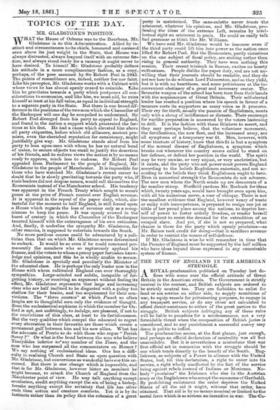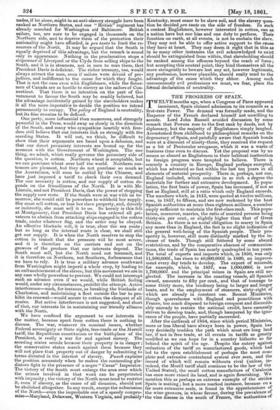THE DUTY OF .ENGLAND IN THE AMERICAN STR,UG-GLE.
A ROYAL proclamation published on Tuesday last de- fines with some care the official attitude of Great Britain in the American crisis. The Government is strictly neutral in the contest, and British subjects are ordered to be strictly neutral too. They are forbidden to .enlist for land or sea service on either side, to supply munitions of war, to equip vessels for privateering purposes, to engage in any transport service, or do any other act calculated to afford direct assistance to either of the great parties to the struggle. British subjects infringing any of these rules will be liable to penalties fora misdemeanour, not a very formidable threat when the composition of British juries is 'considered, and to any punishment a successful enemy may deem it politic to inflict. The proclamation seems, at the first glance, just enough, and perhaps an official declaration of neutrality was all but unavoidable. But it is nevertheless a misfortune that -our first official act in connexion with the struggle should be one which tends directly to the benefit of the South. Eng- lishmen, as subjects of a Power in alliance with the United States, had, till this declaration, a right to enter into its service, a right wholly unaffected by the fact of the service being against rebels instead of Indians or Mexicans. No- body " proclaims" the Irishmen who rise in the Austrian army or the Englishmen whoaccept the summons of Garibaldi. By prohibiting enlistment the order deprives the United States of all the aid it might, without that order, have obtained. That aid is by no means nominal or limited to the moral force which-is so serious an incentive in war. The Ca- nadas, if let alone, might in an anti-slavery struggle have been ranked as Northern States, and one " British" regiment has already marched for Washington vie/ Baltimore. British sailors, too, are sure to be engaged in thousands on the Northern side, and to deprive them of the protection their nationality might have afforded, is pro tanto to limit the re- sources of the North. It may be argued that the South is equally deprived of this advantage, but the remark is sound only in appearance. Nothing in the proclamation stops a shipowner of Liverpool or the Clyde from selling ships to the South, and it is in steamers, not in men to man them, that President Davis is deficient. The richer treasury, too, would always attract the men, even if sailors were devoid of pre- judices, and indifferent to the cause for which they fought. That is not the case even with Englishmen, while the fisher- men of Canada are as hostile to slavery as the sailors of Con- necticut. That there is no intention on the part of Go- vernment to favour the South may be readily believed, but the advantage incidentally gained by the slaveholders makes it all the more imperative to decide the position we intend permanently to occupy. The policy of England is neutrality, but its bias remains to be defined.
One party, more influential than numerous, and strangely powerful in the Press, would sway us slowly in the direction of the South, and many who sympathize heartily with free- dom still believe that our interests link us strongly with the seceding States. It will not, we think, be difficult to show that their arguments are based upon a delusion, and that our direct pecuniary interests are bound up for the moment with the Government of Washington. The one thing, we admit, which really governs• the pecuniary side of the question, is cotton. Northern wheat is acceptable, but we can purchase wheat over half the world. Northern cus- tomers are pleasant, but they do not purchase so much as the Australians, will soon be outbid by the Chinese, and have just imposed a tariff to check their own demand. The one necessity is cotton, and our supply of cotton de- pends on the friendliness of the North. It is with Mr. Lincoln, and not President Davis, that the power of stopping the supply now rests. If the South were at war with us to- morrow, she would still be powerless to withhold her supply. She must sell cotton, or lose her slave property, and, directly or indirectly, she must sell it to us. So keenly is this felt at Montgomery, that President Davis has ordered all pri- vateers to abstain from attacking ships engaged in the cotton trade, under whatever flag, and the order may be obeyed. An effective blockade will, it is true, close the sea route ; but as long as the internal route is clear, we shall still get our supply. It is when the North resolves to stop the cotton in transit that the pressure will be most severe, and it is therefore on the carriers and not on the growers of the produce that our interests depend. The South must sell, but the North need not transmit, and it is therefore on Northern, not Southern, forbearance that we have to rely. It is true a military advance southward from Washington might imperil a whole crop, by leading to an enfranchisement of the slaves; but this movement we are in any case wholly powerless'to prevent. We could not interrupt such an advance even if we would, while British feeling would, under any circumstances, prohibit the attempt. Active interference—such; for instance, as breaking the blockade of Charleston, and maintaining a fleet outside the bar to pro- hibit its renewal—would secure to cotton the cheapest of all routes. But active interference is not suggested, and short of that, our interests lie in maintaining our friendly alliance with the North.
We have confined the argument to our interests in the matter, because apart from cotton there is nothing to discuss. The war, whatever its nominal issues, whether Federal sovereignty or State rights, free-trade or the Morrill tariff, the Republican constitution or the birthplace of the President, is really a war for and against slavery. The seceding states secede because their property is in danger ; the conservative states march against them because they will not place that property out of danger by submitting to terms dictated in the interest of slavery. Punch explains the position accurately when he makes the contending gla- diators fight in the presence of a negro " Caesar" Imperator. The victory of the South must enlarge the area over which the crimes involved in that word can be perpetrated with impunity; the victory of the North must tend to restrict it, even if slavery, as the cause of all disunion, should not be abolished altogether. In any result, except the submission of the North—even the improbable one of a speedy compro- mise—Maryland, Delaware, Western Virginia, and probably Kentucky, must cease to be slave soil, and the slavery quea. tion be decided pro tanto on the side of freedom. In such a contest Englishmen, however interested in cotton, can as a nation have but one bias and one duty to perform. Their function on earth, at all events, is not to enchain the slave. They may not be able to offer active support to the cause they have at heart. They may deem it right that in this. as in so many other instances the evil acknowledged to exist should be extinguished from within, that slaveholding should be ranked among the offences beyond the reach of force ; but accepting this neutral point, they bind themselves all the more stringently to beware lest any act, however legitimate, any profession, however plausible, should really tend to the advantage of the cause which they abhor. Among such unconsciously evil professions we must, we fear, place the formal declaration of neutrality.































 Previous page
Previous page